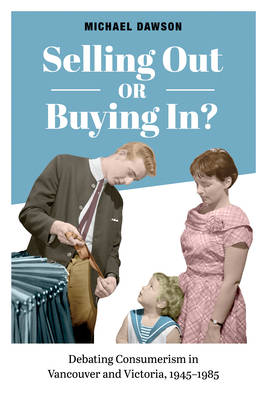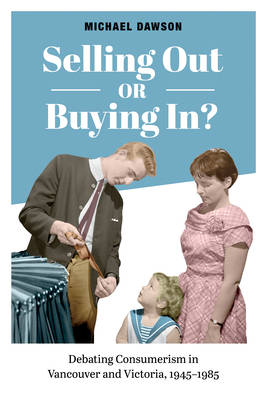
- Retrait gratuit dans votre magasin Club
- 7.000.000 titres dans notre catalogue
- Payer en toute sécurité
- Toujours un magasin près de chez vous
- Retrait gratuit dans votre magasin Club
- 7.000.0000 titres dans notre catalogue
- Payer en toute sécurité
- Toujours un magasin près de chez vous
Selling Out or Buying In?
Debating Consumerism in Vancouver and Victoria, 1945-1985
Michael DawsonDescription
Until the late 1950s residents of Vancouver and Victoria negotiated a shopping landscape that would be unrecognizable to today's consumers: most stores were closed for at least half the day on Wednesdays, prevented from opening during the evenings, and were banned from operating on Sundays. Since that decade, however, British Columbians, and Canadians generally, have made significant strides in gaining greater and easier access to consumer goods.
Selling Out or Buying In? is the first work to illuminate the process by which consumers' access to goods and services was liberalized and deregulated in Canada in the second half of the twentieth century. Michael Dawson's engagingly written and detailed exploration of the debates amongst everyday citizens and politicians regarding the pros and cons of expanding shopping opportunities, challenges the assumption of inevitability surrounding Canada's emergence as a consumer society. The expansion of store hours was a highly contested and contingent development that pitted employees, owners and regulators against one another. Dawson's nuanced analysis of archival and newspaper sources reveals the strains that modern capitalism imparted upon the accepted and established rhythms of daily life.
Spécifications
Parties prenantes
- Auteur(s) :
- Editeur:
Contenu
- Nombre de pages :
- 224
- Langue:
- Anglais
Caractéristiques
- EAN:
- 9781487521868
- Date de parution :
- 13-05-18
- Format:
- Livre broché
- Format numérique:
- Trade paperback (VS)
- Dimensions :
- 150 mm x 226 mm
- Poids :
- 362 g

Les avis
Nous publions uniquement les avis qui respectent les conditions requises. Consultez nos conditions pour les avis.






